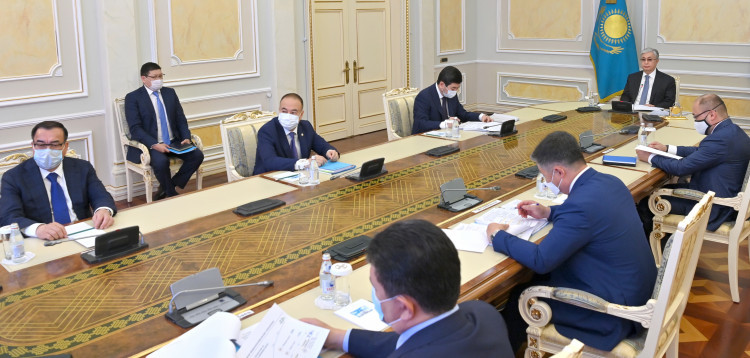NUR-SULTAN – President Kassym-Jomart Tokayev outlined the outcomes of the first half of 2021 and set the tasks for the months ahead at the July 10 expanded government meeting, reports the Akorda press service.

President Tokayev during the meeting. Photo credit: Akorda press service
Prime Minister Askar Mamin, Head of the Presidential Administration Yerlan Koshanov, ministers as well as governors and mayors attended the meeting in a virtual format.
Economic growth reached 2.2 percent in the first six months of 2021, said Tokayev.
“This is a good indicator. Last year, due to the pandemic, gross domestic product contracted by 2.6 percent. We need to restore it as soon as possible,” he told the meeting.
Businesses benefited from the revival of the global economy, anti-crisis measures being taken by the country, and the lifting of restrictions.
Despite the pandemic, the number of businesses grew three percent.
New approaches to fighting the coronavirus infection
But adapting to life, where the coronavirus infection has an evolving nature and new variants continue to cause a surge in cases worldwide, is crucial, according to him. The task is now to prevent the increase in cases and the overload of the healthcare system.
“The main focus should be on reducing severe cases and mortality, as well as on treating patients with complications. Fundamentally different approaches to the fight against coronavirus are not only about medical aspects, but also restrictive measures in relation to business. Monitoring groups (that check the compliance of businesses to sanitary regulations) need to be revised and digital solutions, such as Ashyq, need to be used more extensively,” said Tokayev.
Heavy toll on the education system
The pandemic has tremendously disrupted the education system. Globally, nearly 1.2 billion children are out of classrooms.
Tokayev instructed the government to ensure a smooth transition for children to return to classrooms in the upcoming academic year. He cautioned the government to address the failures that occurred last year.
“It is clear that with the new variants of coronavirus, it is not easy to accomplish this task. Therefore, it is necessary to develop a comprehensive approach that will ensure the best protection of students and teachers,” said Tokayev.
Increased inflation risks
During the meeting, Tokayev also spoke about the increased inflation risks as a result of the anti-crisis measures, significant fiscal stimulus, and soft monetary policy. Inflation in Kazakhstan in the first six months was 7.9 percent, particularly the rise in food prices.
According to the UN Food and Agriculture Organization, global food prices have risen by 40 percent, the highest in a decade.
Tokayev said the pandemic has exposed the country’s vulnerability in terms of food security. He criticized the country’s Agriculture Ministry for failing to keep the prices down.
“Criticism towards the inability of the domestic agricultural industry to provide the domestic market with essential products is absolutely fair. Along with production costs, the key pricing factors are seasonality and nontransparent intermediary schemes. Seasonality of supply, as the term itself suggests, is absolutely expected, it is predictable and therefore manageable,” said Tokayev.
Building modern and affordable vegetable storage facilities is the solution, according to him. Only six regions have sufficient storage capacity for vegetable products – Atyrau, Zhambyl, Karaganda, Kostanai, Pavlodar, and North Kazakhstan regions.
Tokayev also told the Atameken National Chamber of Entrepreneurs and the government to assess the efficiency of existing tools used to curb prices for socially significant food products and propose a package of new and more effective measures.
Increasing incomes of the population
Tokayev also stressed the need for urgent and large-scale measures to increase the incomes of the population and reduce the scale of the shadow economy.
Rural areas should be the focus of these efforts, he said, citing the pilot project implemented in the Zhambyl Region, where 60 percent of the population live in rural areas. The measures included additional financial support for agricultural producers and the creation of agricultural cooperatives.
“The results are good. Agricultural production has doubled, livestock increased by 24 percent, the number of unemployed people, recipients of targeted social assistance, and the unregistered self-employed also decreased. The government should consider expanding this project,” said Tokayev.
Budget efficiency
Tokayev said it is important to improve the quality of the country’s external and internal debt management, which he described as a matter of long-term stability of the state budget and fiscal capacity.
“Over the next 25 years, the expenditures to implement planned government obligations are expected to grow almost sixfold. By 2025, the share of foreign debt in the government debt structure is projected to rise from 21 percent to 49 percent. At the same time, most foreign loans are denominated in foreign currencies. The quasi-public sector also has a significant debt burden. At the same time, we do not have a unified document on approaches to public debt management. In short, there is a lot to think about,” Tokayev told the meeting.
He instructed the government to develop the document on state and quasi-state debt management.
The National Fund, which has been accumulating the country’s oil revenues, has been increasingly used in 2020.
While the country aims to reduce its reliance on the transfers from the National Fund, this year the volume of transfers will amount to 36 percent of the budget income, only four percent less than in 2020.
“The government liabilities are growing. This is inevitable in times of crisis,” added Tokayev.
